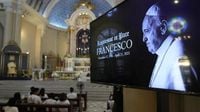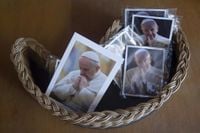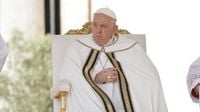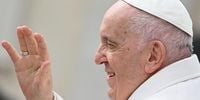Pope Francis, the leader of the Roman Catholic Church, passed away on Monday morning, April 21, 2025, after months of health concerns. The Vatican confirmed the news, marking the end of a significant era in modern Catholicism. He was 88 years old.
Just a day before his death, on April 20, Pope Francis had appeared on the balcony of Saint Peter's Basilica, greeting thousands of faithful gathered to celebrate Easter. However, his appearance was overshadowed by visible signs of frailty, as he struggled to deliver his message and had to delegate the reading of his text to a collaborator.
The pontiff's health had been a topic of concern for many, especially after he nearly died from a severe illness in February 2025. He had been hospitalized for 38 days due to bilateral pneumonia, and despite his recovery, he continued to face various health issues, including hip problems and respiratory infections. Cardinal Kevin Farrell announced the Pope's passing at 7:35 AM, stating, "This morning, the Bishop of Rome, Francis, returned to the house of the Father." He emphasized the Pope's lifelong commitment to serving the Lord and the Church, highlighting his dedication to the values of the Gospel.
In the wake of his death, preparations for his funeral are underway. The Vatican's regulations stipulate a nine-day mourning period, followed by a conclave to elect his successor, which will take place within 15 to 20 days. During this interim period, Cardinal Farrell will assume the role of acting Pope. Interestingly, Pope Francis had expressed his wish to be buried in the Basilica of Saint Mary Major, a departure from tradition that has not seen a papal burial there for over three centuries.
In November 2024, the Vatican introduced a simplified ritual for papal funerals, allowing for burial in a simple wooden and zinc coffin, marking a significant change from the elaborate three-coffin system previously used.
Pope Francis's 12-year pontificate was marked by his unwavering commitment to social issues, including the defense of migrants, environmental advocacy, and social justice. He was known for his progressive stance on many issues, yet he did not fundamentally alter the Church's doctrine on contentious topics such as abortion or priestly celibacy. His health challenges did not deter him from maintaining a rigorous schedule, often participating in numerous engagements, despite warnings from his doctors.
Throughout his papacy, Pope Francis faced significant health challenges, including two hospitalizations in 2023, one of which involved a major abdominal operation. His health issues were compounded by a history of respiratory ailments dating back to his youth, when he suffered from acute pleurisy, leading to partial lung removal.
His commitment to humanitarian causes was evident from the outset of his papacy. His first trip outside of Rome in 2013 was to the island of Lampedusa, where he highlighted the plight of migrants. He consistently condemned the indifference shown towards the migrant crisis, both in Europe and beyond. In February 2025, he notably criticized the mass expulsions of migrants proposed by then-President Donald Trump.
In 2015, Pope Francis published his groundbreaking encyclical, "Laudato si," addressing ecological and climate issues, and calling for urgent action to protect the planet. His efforts to reform the Church were met with mixed reactions. While he aimed to modernize the Church and address issues such as sexual abuse, critics pointed out that substantial changes were often slow to materialize.
As the first non-European pope and the first Jesuit to hold the position, he brought a new style of leadership that was both charismatic and approachable. However, his progressive image was often tempered by the realities of a conservative institution resistant to rapid change. His famous quote, "Who am I to judge?" regarding LGBTQ+ individuals, encapsulated his open approach, yet many felt that his actions did not always align with his words.
Despite his popularity among many Catholics and his efforts to engage with broader societal issues, Pope Francis faced criticism from conservative factions within the Church. His decisions, such as allowing blessings for same-sex couples and restricting traditional Latin Mass, sparked significant backlash. These controversies highlighted the ongoing tensions within the Church between progressive and conservative elements.
In Switzerland, reactions to his death have been varied, with many Christian and political figures reflecting on his legacy and expressing their hopes for his successor. Some lamented the loss of a leader who sought to bring the Church closer to the marginalized, while others anticipated a return to more traditional values.
As the world mourns the passing of Pope Francis, questions loom about the future direction of the Catholic Church. The upcoming conclave will be critical in determining whether his successor will continue his legacy of social engagement and reform or revert to more traditional doctrines.
Pope Francis's impact on the Church and the world at large is undeniable. His commitment to social justice, environmental issues, and interfaith dialogue has left a lasting mark. As the Church stands at a crossroads, the challenge for his successor will be to navigate the complexities of modern society while remaining true to the core tenets of Catholicism.







